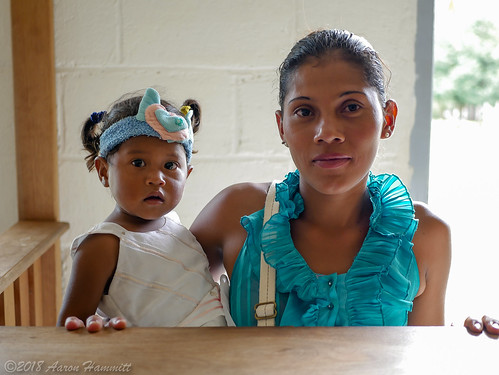Two years ago I visited a different village in Honduras, but up to this point the people of Rus Rus have largely been just names and faces in photographs. One of my favorite aspects of the trip was getting to know the Miskito people in person. After a few days in Rus Rus I finally got over my insecurity about approaching strangers and using my limited Spanish. Interestingly, Spanish is not their first language either, and some of them only speak Miskito (which sometimes made for an awkward moment, when I was not sure if a group was laughing at me, or out of embarrassment, or for some other reason!). I found that most people became very friendly and relaxed when I spoke with them, and were happy to tell me about themselves and to have their pictures taken. It made the visit much more enjoyable when I got in the midst of the people, rather than just hanging around on the fringes!
One day during the trip, I was reading Exodus 30 and verses 11-16 jumped out at me:
Then the Lord said to Moses, “When you take a census of the Israelites to count them, each one must pay the Lord a ransom for his life at the time he is counted. Then no plague will come on them when you number them. Each one who crosses over to those already counted is to give a half shekel, according to the sanctuary shekel, which weighs twenty gerahs. This half shekel is an offering to the Lord. All who cross over, those twenty years old or more, are to give an offering to the Lord. The rich are not to give more than a half shekel and the poor are not to give less when you make the offering to the Lord to atone for your lives. Receive the atonement money from the Israelites and use it for the service of the tent of meeting. It will be a memorial for the Israelites before the Lord, making atonement for your lives.”As a "ransom for his life" everyone was to give the same amount; the rich were not to give more, and the poor were not to give less. That really stood out to me. During my trek from Burlington to Rus Rus I encountered many people, ranging from the sharply-dressed business man who seemed to think a lot of himself, to the elderly woman from a tiny village across the Nicaragua border. That "important" man might scoff at the idea that he was no more valuable than a widow from an unknown village, but the reality is that apart from Christ, we are equally poor and destitute, in need of a Savior to ransom us from sin and death.
I have to admit that I sometimes fall into the trap of feeling pity toward those we sometimes call "less fortunate" (which tends to mean they have fewer material resources than we do). It is so easy for me to unconsciously set myself up just a bit higher than those I've come to serve. Should I have compassion on those who don't have access to basic medical care, or education, or spiritual nourishment? Yes! But the more I interacted with the people of La Mosquitia, the more I was reminded that they are not so different from me. Each one has a unique story and is deeply loved by the Lord. They have gifts, talents, passions, and desires, and we can learn a lot from them!
Of course, I know all this intellectually, but spending time with the people really helped it to sink in. Being part of an aviation and medical ministry, we have very high standards for operations, maintenance, etc, and we follow protocols to make sure that everything is done with safety and excellence in mind. But in the developing world, they sometimes have to do the best with what they have, and so we have to carefully walk the line between telling them how we think things ought to be done, and coming alongside them, supporting them, loving them, and growing the ministry together. MAG temporarily does not have any expatriates in Rus Rus, and I noticed that the people there are taking increasing ownership of the ministry. That's encouraging!
I thank the Lord for the many blessings and resources that I have been entrusted with. But may I never think that I'm more blessed, or set myself up on a pedestal, simply because of the resources I've been entrusted with. Over the course of nearly three weeks in Honduras I came to appreciate anew the fact that each one of these faces represents a person who is known, loved, and valued by God, just as I am!
